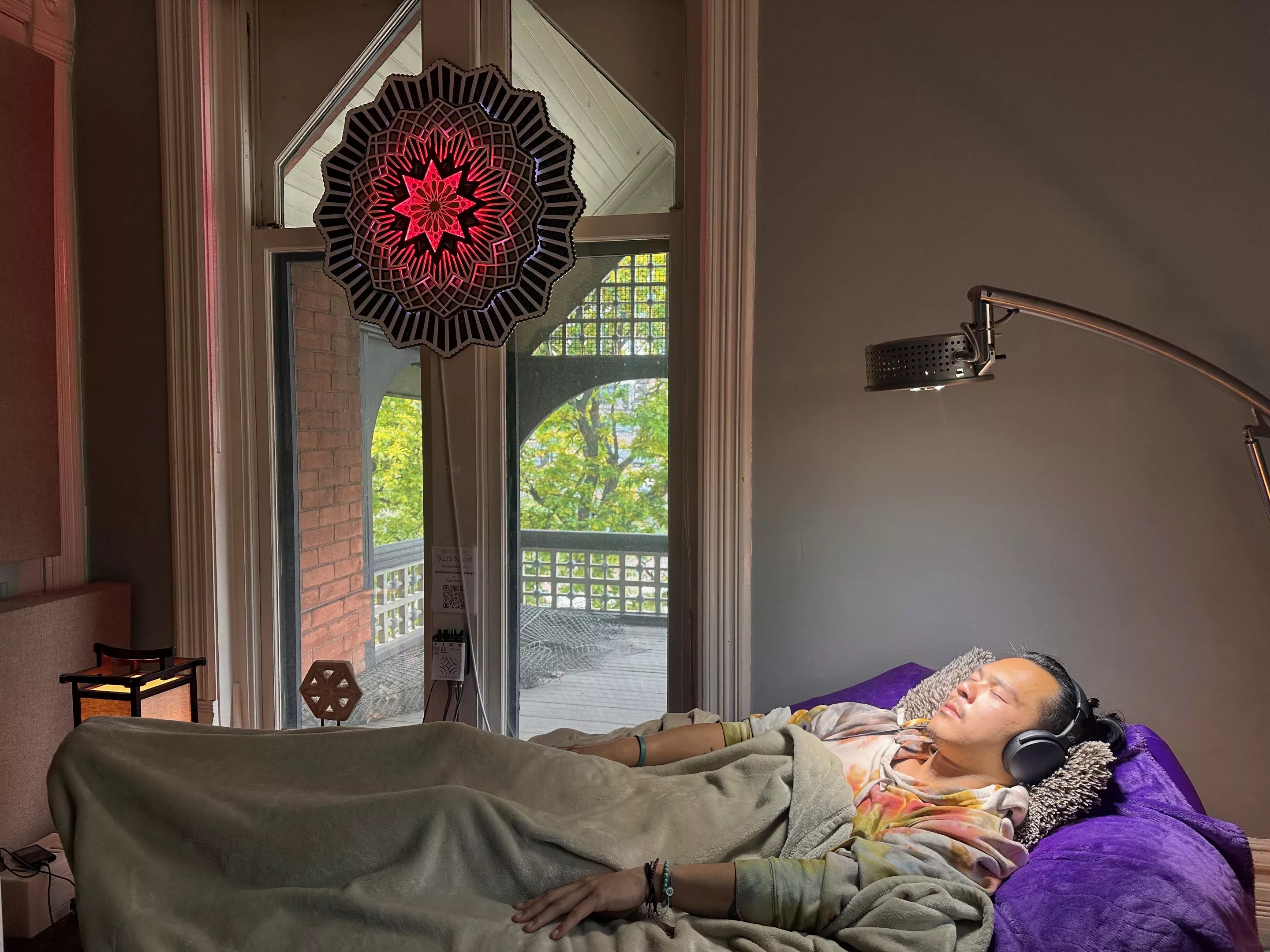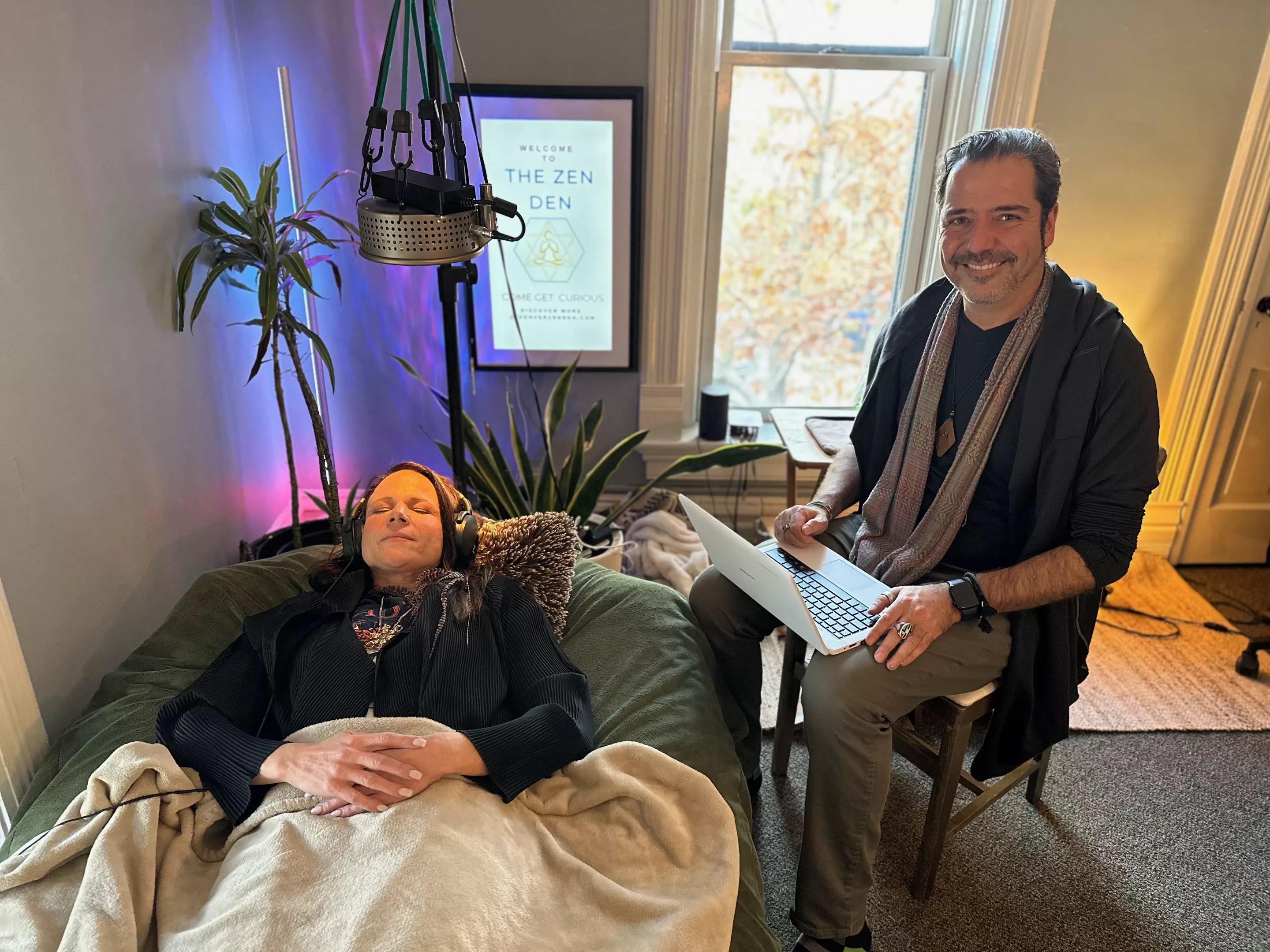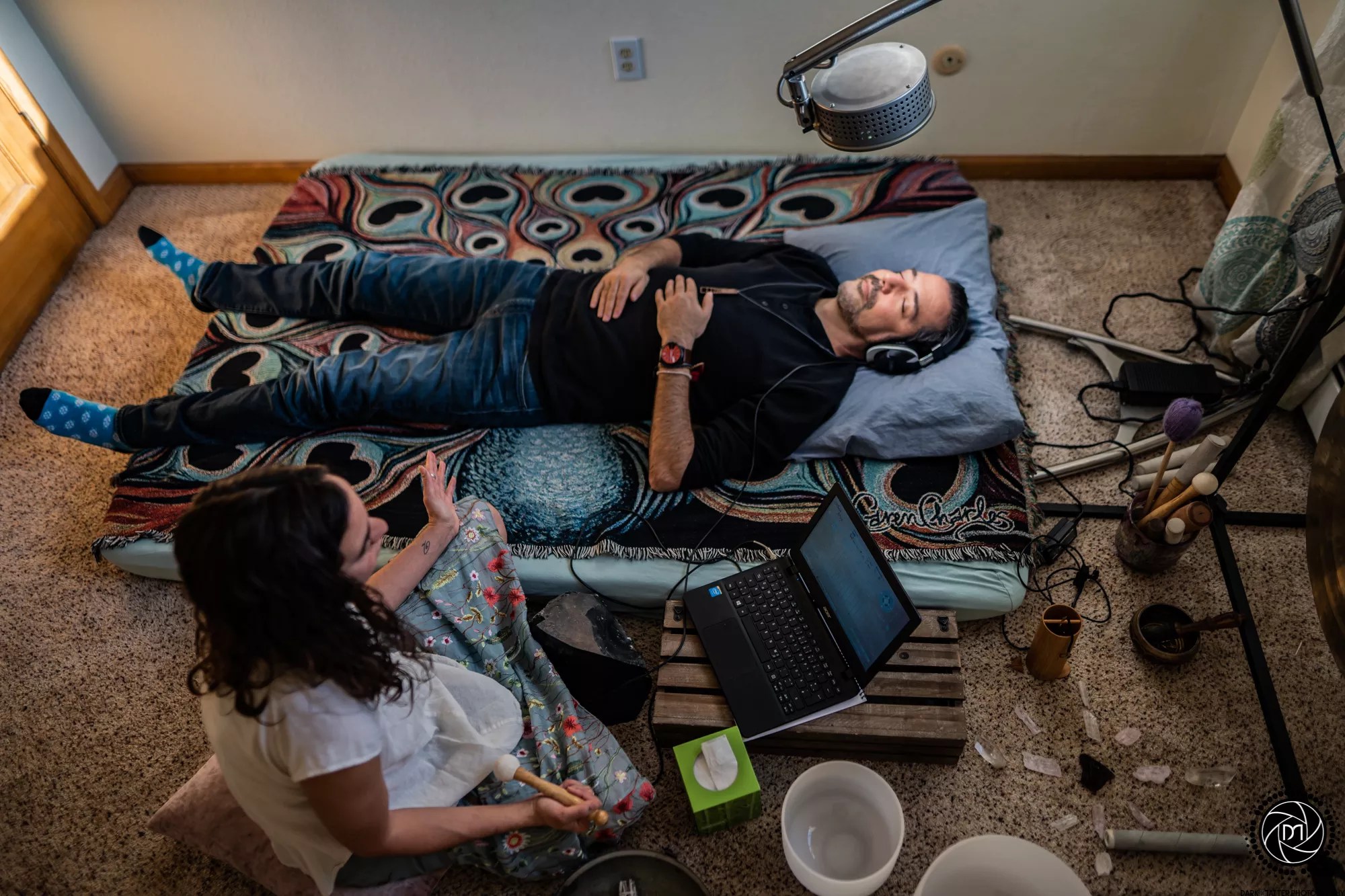
Courtesy of Michael Pottern

Audio By Carbonatix
“Future medicine will be the medicine of frequencies,” said Albert Einstein, and he was right on the money, given the current use of radio frequencies for MRIs, X-rays, electrosurgery scalpels and ablation, multiple cancer treatments and so much more.
That quote inspired Michael Pottern, the founder and “vision keeper” of Denver Zen Den, the Mile High City’s first sober psychedelic clinic, which is using vibrational frequencies, virtual reality and light to emulate the mind-opening, healing experience bestowed by such plant-based hallucinogens as DMT and psilocybin. Located in a Victorian brick house seemingly plopped at random between the Denver Aquarium and I-25, the wellness spa isn’t set in the most tranquil part of Denver. But by the time I left, even the cars honking in highway traffic became white noise; I was still tingling with the effervescent effects of Zen Den’s signature sober psychedelic experience.
Although a “sober psychedelic” experience may sound hokey, it produces the same illuminating, motivating effects found in DMT blast-offs, while satisfying the psychedelic-curious in the process. Several psychedelics were legalized in Colorado following the passage of Proposition 122, but many people are still too squeamish to try DMT, psilocybin, ibogaine or mescaline, even if they know about the healing benefits. That’s because they’ve also heard of potentially repellent factors, such as bad trips, paranoia or becoming like anyone in the Love Has Won cult. Confronting deep-seated fears or trauma through hallucinogens doesn’t appeal to everyone. If the mind were a tight sweater, psychedelics can pull the thread to make it the perfect fit – but tug too much, and it all unravels.
Pottern understands this, and notes that with psychedelics, some people can easily start chasing the revelatory high without integrating the lessons learned from trips. (Think of those festival-hoppers who decided they were “shamans” after a handful of raves, Burning Mans or a trip to Lake Atitlán.) “That’s why this actually can be really good help with preparation and integration,” he says of the sober psychedelic experience, adding that people must attend their sessions completely sober, allowing them to really soak up the benefits. “We are thrilled to be part of this new awakening, leveraging cutting-edge technologies to enhance accessibility, as well as offering support for the preparation and integration of individuals embarking on their own psychedelic explorations with plant medicine, ketamine or other compounds that create psychedelic-like experiences,” he says.
Offering such an experience “gives people access, both in understanding things as well as [receiving] some of the same benefits without having to do things that they might be concerned about doing on a regular basis,” such as therapeutic microdosing, Pottern adds. “Because of the psychedelic movement and because this literally does create a very similar psychedelic experience, we’ve got a wide range of people that are coming back on a continual basis, because they’re looking for pattern changes and for better habits. They’re looking to just be supported.”
Not that Zen Den is against the use of psychedelic therapy. “We’re actually very supportive of the plant medicine movement,” Pottern says. “We’re just a nice complement, because we’re accessible, we’re trusting and legal, and we have a lot of the same benefits, especially with repeated use.”
And his clients agree. “The tools at Denver Zen Den help induce different brainwave states, much like meditation, but in a way that is accessible to anyone, no matter their prior experience in self-exploration practices,” according to a statement from holistic doctor Christine Smith. “These experiences help to break default neurological patterns, much like the purpose behind psychedelic therapy, but substance-free, which is the ultimate practice and application for our everyday lives.”

Michael Pottern oversees a participant in his sober psychedelic experience.
Courtesy of Michael Pottern
The experience itself is immersive. After selecting a crystal to hold through the process, you nestle in a BLISSpod, essentially the comfiest bean bag ever that also administers vibro-acoustic therapy as it vibrates to psychedelic, tribal tunes played through noise-canceling headphones. That’s supplemented by the Lucia N°03 light, a hypnagogic lamp that hangs over your head and is used as a neurostimulator in light therapy, precisely programmed to flicker in such a way that it sends patterns and images similar to those of a kaleidescope to the brain, but while your eyes are closed.
It’s relaxing, soothing, and trippy as all get-out. Trippiest of all, the patterns aren’t even programmed. “Those aren’t imprinted in the light; that’s actually coming from within, the same with DMT or other kinds of plant medicines,” Pottern explains. “It is a marriage of the body, mind and spirit all at the same time. And that’s what DMT is actually in our brains for – when you’re born or when you’re entering death.
“And that’s how the Lucia light was discovered. There were neuropsychologists out of Austria, and they were researching end of life,” he continues. “And then they realized, ‘Wow, there’s something even deeper here that we can actually help induce in a way that is very non-invasive, very approachable, and also can be repeatable and accessible.'”
Light therapy has been implemented for decades now as a means to both calm and stimulate the nervous system, in everything from light boxes for depression to EMDR therapy. The stroboscopic therapy offered by the Lucia light helps stir blood flow to the brain, activating the visual cortex, prefrontal cortex and pineal gland, which stimulates the alpha brainwave rhythms that instigate peace through the mind and body. “The brain syncs up with the pulsing, and what that creates is a hypnagogic state…that liminal space in between awake and asleep,” Pottern says. “That’s when the brain is going into alpha releases – these places where it has profound connection to consciousness.”
But it is also more primordial than that, he notes: “Stroboscopic light therapy is something we’ve known since flickering candles; we love fire, watching a campfire. That’s because there’s something soothing to our nervous system.”
A vest worn during the session also adds to the vibroacoustic therapy of the BLISSpod, and Pottern is particularly excited about an upcoming addition. “We have another vest coming from France next month, where you can actually feel fire, wind, rain,” he says, moving his hands from his temples to signify “mind blown.”
It’s hard to think the experience could get more mind-blowing, though. You can choose between 30-, 45-, 60- and 90-minute personalized sessions, as well as a half-day retreat; Zen Den also offers therapy to couples, groups, professional leaders and parents in 45- and 90-minute sessions and retreats. Pottern himself uses the “Reboot” or “Heart Opener” session once or twice a week, he says. There are also packages for those who want to commit to the practice or gift it to a psychedelic-curious friend. And with Zen Den’s Mindful Social Club, Pottern says that sober psychedelic experiences are as much about connecting with others as with yourself and healing. “This is not just about us. It’s about connecting the network of people that are doing this,” he says.
“I think the pandemic really showed us how much we’re stressing out and needing these more human connections,” he adds. The experience “brings you back to self, without anything else. It doesn’t get into deep trauma. It actually allows you to stay in this really perfect middle place, which is why we have people do journaling and we have different technologies…to help them trust what’s happened. So it’s not just about the one experience; that’s just the start.”

Courtesy of Michael Pottern
Pottern has been piloting the experience since February, but Zen Den is his first brick-and-mortar location; he opened this month at 2345 Seventh Street, in that Victorian structure, which also houses Archipelago, a social club. “The second floor became wellness suites for rent, and I saw the opportunity,” he says. “The building had an amazing energy and was perfect for the creation of the Denver Zen Den.”
Born and raised in Denver, Pottern worked in real estate in Chicago for ten years before moving back here in 2016 and founding the tech company Find My Zen. “Denver Zen Den emerged from Find My Zen earlier this year in response to the growing demand for a one-of-a-kind, in-person psychedelic experience,” he explains. “The Find My Zen platform remains an active space where individuals can explore a diverse range of wellness activities throughout the greater wellness community at their own pace and according to their interests. Later in 2024, the Find My Zen website will include additional unique local experiences, services and courses. Our goal with both businesses is to connect wellness enthusiasts with curated opportunities to enrich their journey while showcasing various options to make emerging wellness trends accessible to those with limited time and travel constraints.”
His own attraction to holistic healing is nothing new. “Being a transcendental meditator for the last ten years and being on the board of advisers for the David Lynch Foundation and helping bring meditation to public schools, that was something that really initially got me,” he says. “As a serial entrepreneur, I just continue to see where people are looking for something but they don’t have the network to figure it out.”
And that like-minded, healing network is what Zen Den will provide. If frequency medicine is the future, then Zen Den is proof that the future is now, and right in the Mile High City.
“I think this is all about to become a lot more of a thing, because we live in such an energy-overwhelmed state of the world, especially in Western culture,” Pottern says. “‘Somatic hygiene’ is what I like to call it. Because I think we should be clearing our energy system, as well as our nervous system and our mental system, and really say, ‘Okay, it’s a new day.'”